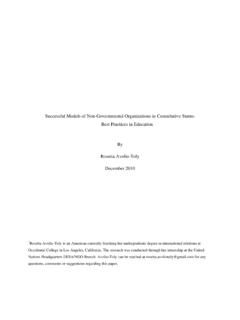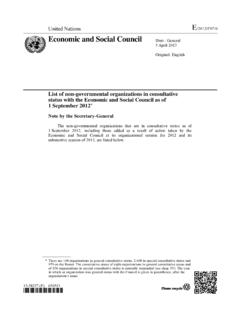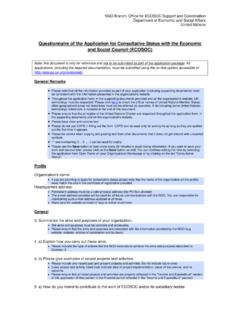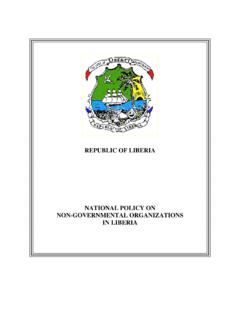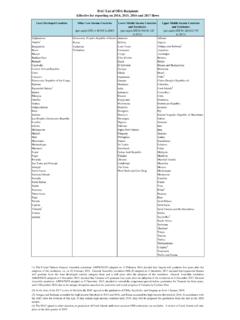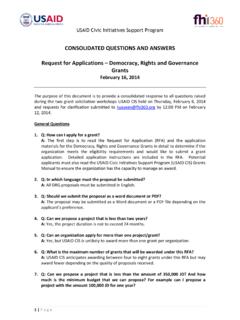Transcription of an NGOs Guide to Consultative - csonet.org
1 What is ECOSOC? The Economic and Social Council is the principal organ that coordinates the economic, social and related Working with work of the 14 United Nations specialized agencies, functional commissions and f ive regional commissions. It serves as the central forum for discussing international economic and social issues, and for formulating UNITED NATIONS. policy recommendations addressed to Member States and the United Nations system. What is Consultative status? Consultative status is an accreditation framework that benefits both the United Nations and the ngos . As stated by resolution 1996/31: .. Consultative arrangements are to be made, on the one hand, for the purpose of e nabling the Council or one of its bodies to secure expert information or advice from organizations an ngos Guide to having special competence in the subjects for which Consultative arrangements are made, and, on the other hand, to enable international, regional, sub-regional and national organizations that represent important elements of public opinion to express their views.
2 ECOSOC resolution 1996/31, part II, paragraph 20. Why would my NGO want Consultative status? Consultative Status ECOSOC provides ngos the opportunity to be heard by a truly global audience and contribute to its agenda. An NGO with Consultative status can: Attend international conferences and events; Organize side events;. M. ake written and oral statements Enter United Nations premises;. at these events; Have opportunities to network and lobby. Printed at the United Nations, New York 11-42007 September 2011 3,000. Working with an ngos Guide to Consultative Status United Nations New York, 2011. Table of contents Human Rights Council.
3 17. The United Nations and ngos .. 1 Written statements .. 19. ECOSOC and its subsidiary bodies.. 3 Oral statements.. 22. ECOSOC Consultative status.. 6 Organize your own event at the United Nations .. 24. UN grounds pass .. 8. Events participation.. 11 The application process.. 26. Commission on Sustainable Development.. 11 1. Creating a profile for your NGO .. 27. Commission on the Status of Women.. 12 2. Submitting your online application .. 29. Commission for Social Development.. 12 3. Screening your application.. 32. Permanent Forum on Indigenous Issues.. 13 4. Review of your application by the Committee on ngos .. 33. Commission on Population and Development.
4 13. 5. The Committee makes a recommendation .. 34. United Nations Forum on Forests.. 14. 6. Final decision by ECOSOC.. 36. C ommission on Crime Prevention and Criminal Justice.. 14. Quadrennial reports .. 38. Commission on Narcotic Drugs .. 15. Contact information and useful links.. 41.. Commission on Science and Technology for Development.. 15. Statistical Commission.. 16. iii The United Nations and ngos Non- governmental organizations ( ngos ) have with matters within its competence. Such been actively engaged with the United Nations (UN) arrangements may be made with international organizations and, where appropriate, with since its inception in 1945.
5 They work with the United national organizations after consultation with Nations Secretariat, programmes, funds and agencies the Member of the United Nations concerned. in various ways, including in consultation with Mem- United Nations Charter, ber States. ngos contribute to a number of activities Chapter X, Article 71. including information dissemination, awareness rais- ing, development education, policy advocacy, joint Article 71 of the UN Charter opened the door operational projects, participation in intergovernmen- to provide suitable arrangements for consultation tal processes and in the contribution of services and with non- governmental organizations.
6 The consulta- technical expertise. tive relationship with ECOSOC is governed today by ECOSOC resolution 1996/31, which outlines the eligi- Article 71 of the United Nations Charter, bility requirements for Consultative status, rights and which established the Economic and Social Council obligations of ngos in Consultative status, procedures (ECOSOC), states the following: for the withdrawal or suspension of Consultative status, The Economic and Social Council may make suit- the role and functions of the ECOSOC Committee on able arrangements for consultation with non- ngos , and the responsibilities of the UN Secretariat in governmental organizations which are concerned supporting the Consultative relationship.
7 1. The United Nations has been working to strengthen cooperation with ngos across the entire United Nations system and in all areas of its work. As a result, United Nations entities are identifying new modalities to promote increased and more strategic participation of ngos . Th e necessity of strengthening UN/ ngos relations has been underlined in various documents, in particu- lar in the Millennium Declaration in September 2000. The commitment of Member States to provide greater opportunity to ngos was reaffirmed in the 2005 World Summit Outcome Document. From the beginning, the Economic and Social Council (ECOSOC) has been the main entry point into the UN system for ngos .
8 ECOSOC remains the only main UN body with a formal framework for NGO. participation. In 1946, 41 ngos were granted consulta- tive status by the council; by 1992 more than 700 ngos had attained Consultative status and the number has been steadily increasing ever since to more than 3,400. organizations today. 22. ECOSOC and its subsidiary bodies The Economic and Social Council is the principal and panel discussions with members of civil society organ that coordinates the economic, social and related throughout the year. Once a year, it meets for a four- work of the 14 United Nations specialized agencies, week substantive session in July, alternating between functional commissions and five regional commissions.
9 New York and Geneva. The annual session is organized It serves as the central forum for discussing interna- in five segments and include: (i) the High-level seg- tional economic and social issues, and for formulating ment; (ii) the Coordination segment; (iii) the Opera- policy recommendations addressed to Member States tional Activities segment; (iv) the Humanitarian Affairs and the United Nations system. segment; and (v) the General segment. ECOSOC consists of 54 Member States elected by The Annual Ministerial Review (AMR), launched the General Assembly for overlapping three-year terms. in 2007 and held during the annual High-level seg- Seats on the Council are allotted based on geographical ment of ECOSOC, assesses progress made towards the representation with 14 allocated to African States, 11 to United Nations Development Agenda (UNDA).
10 It also Asian States, 6 to Eastern European States, 10 to Latin serves as a global high-level forum with broad-based American and Caribbean States, and 13 to Western participation to exchange lessons learned and highlight European and other States. successful practices. The work of the Council is conducted through The Development Cooperation Forum (DCF), several sessions and preparatory meetings, round tables also launched in 2007, is mandated to enhance the 3. implementation of the internationally agreed develop- Commission on Narcotic Drugs ment goals and promote dialogue to find effective ways Commission on Crime Prevention and Criminal Justice to support it.

